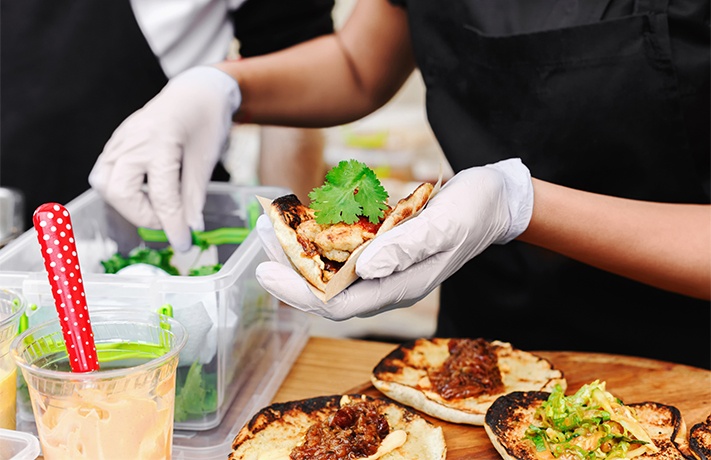 The number of Quick Service Restaurants (QSRs) in the U.S. has grown steadily in the past decade and is forecast to reach nearly 250,000 in 2018. Making up a major portion of this growth are fast casual restaurants that offer fresh, build-your-own meal options. The popularity of these types of establishments makes sense, as it aligns with 2018 food trends that indicate heightened interest in healthy, mindful eating and cleaner labels.
The number of Quick Service Restaurants (QSRs) in the U.S. has grown steadily in the past decade and is forecast to reach nearly 250,000 in 2018. Making up a major portion of this growth are fast casual restaurants that offer fresh, build-your-own meal options. The popularity of these types of establishments makes sense, as it aligns with 2018 food trends that indicate heightened interest in healthy, mindful eating and cleaner labels.
The new approach to healthy eating is abandoning calorie counting, fad diets and quick fixes. Rather than focus merely on weight loss and temporary, restricted food plans to achieve it, consumers are embracing ways of eating that can be sustained for the long term as a normal way of life. As part of this trend, they’re expressing concern over where their food comes from, if it’s ethically sourced and whether they can recognize the ingredients. The overall health benefits of the food they consume — and its chain of custody — is being considered more than ever.
Even customers who may not consider themselves mindful eaters are being influenced by the trend and, in general, want healthier options than what’s offered on most traditional menus. Menu changes are being embraced by QSRs to meet these demands, and new restaurants are grasping opportunities to cater to a growing number of mindful eaters. This attitude shift among consumers does pose some challenges, however.
Challenges for Quick Service Restaurants
Perhaps one of the greatest challenges facing QSRs, especially those that have already established a reputation in the marketplace, is breaking stereotypes — the assumption that “fast” food is equivalent to junk food. Robust marketing campaigns are being implemented by major players to address this disconnect and promote new menu options, but long-held beliefs can shift slowly.
In contrast, smaller franchises may actually have an advantage over household names. They have a greater ability to adapt business models to target mindful eaters and may be able to shift focus more easily and quickly than a global corporation that relies on a vast supply chain and may suffer from organizational bottlenecks and roadblocks.
QSRs should consider more than their meat and produce when assessing their menu items. Increasingly, consumers will inquire about ingredients included in soups and sauces, whether there are artificial ingredients in fillings, dips, dressings, coatings and various condiments, and they may even want to know how and where those ingredients are sourced. Transparency about ingredients will be imperative for any QSR hoping to make a mark.
The mindful eating trend will demand a shift from artificial ingredients to more wholesome, natural alternatives. Traditional ingredients such as milk, eggs and butter are making a comeback, but the high costs and volatile markets associated with them are often prohibitive, forcing QSRs to raise prices and abandon another trend that always tops the list — value.
QSRs could choose to substitute traditional ingredients with alternative gums and starches, however, it most often results in disappointing textures and viscosity, and will likely compromise signature flavors that customers have come to love.
A more viable alternative is functional whey protein, such as Grande Bravo®, which can be included as part of an all-natural formulation. Its superior water-holding capabilities means that QSRs can maintain and often improve texture while reducing fat and calories, in addition to cutting costs associated with traditional ingredients. An added benefit is that functional whey protein requires no refrigeration or special regulation considerations often associated with traditional ingredients, reducing costs (and handling headaches) even further.
Challenges for Food Manufacturers
When QSRs face challenges, so too will the food manufacturers that serve them. It’s imperative for food manufacturers to leverage the mindful eating trend and offer products that can meet their demands while keeping costs at bay. The same considerations of including natural, wholesome ingredients in formulations needs to be adopted, and a similar approach to keeping costs in check and providing alternative ingredients such as Grande Bravo can be implemented by food manufacturers as well.
Food manufacturers wishing to improve partnerships with QSRs will need to provide innovative solutions to attract the growing segment of mindful eaters, and introducing functional whey protein in their formulations is a cost-effective way to do that.
Increasingly, consumers will inquire about what’s in the foods they eat and be more mindful of where that food comes from. Stay ahead of the curve by accessing our free eBook below, and contact our team of expert food scientists to see how replacing high-cost, high-fat ingredients can improve nutrition in formulations without compromising flavor or texture and, as a result, improve relationships with those who are part of the growing mindful eating trend.




